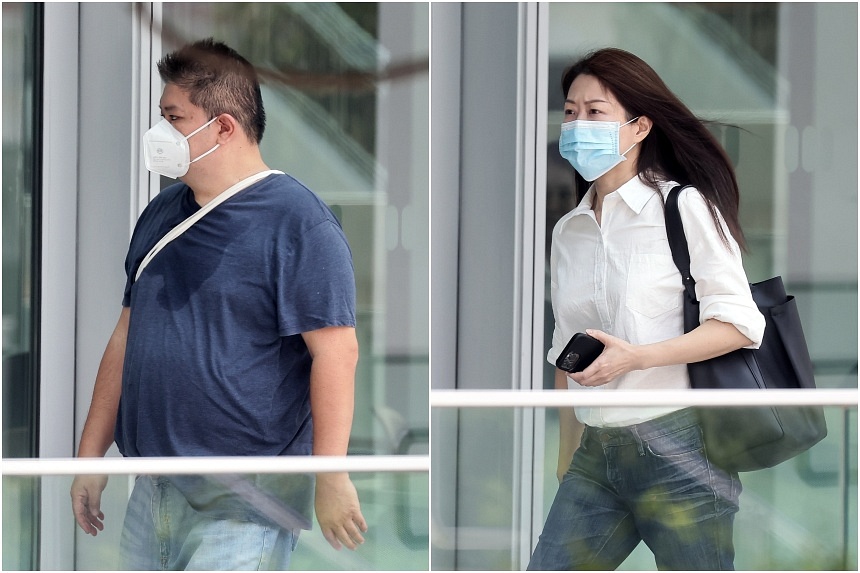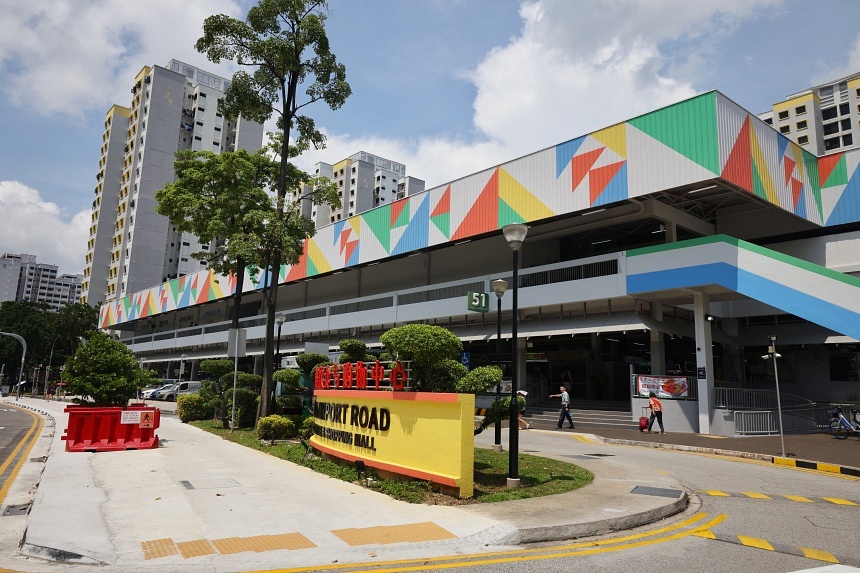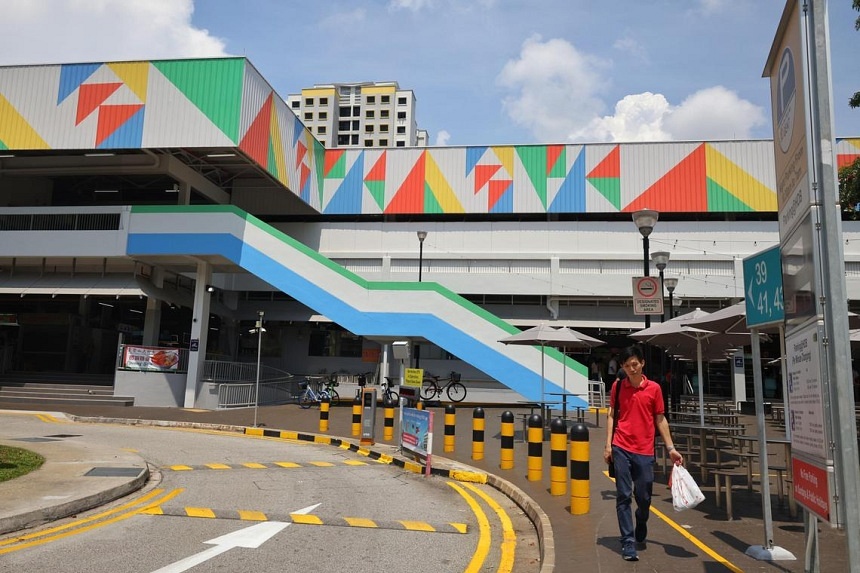Upgraded Old Airport Road Food Centre cleaner, brighter, but some bemoan the ventilation
The Old Airport Road Food Centre and Shopping Mall is managed by Kopitiam, which is part of the FairPrice Group. ST PHOTO: JASON QUAH
Chin Soo Fang and
Fatmah Khan
Nov 07, 2024
SINGAPORE – Dakota resident Oh Ai Khim missed making a daily pit stop for a meal at her favourite food centre when it was closed for four months to get upgraded.
“I was ‘suffering’ as I missed the variety of delicious food here,” she said on Nov 4. “I’m glad to be back and I can see that it’s cleaner, cooler and brighter.”
The 70-year-old retired dishwasher summed up the sentiments of quite a few patrons and hawkers after revisiting the food centre and shopping mall at Block 51 Old Airport Road, which reopened on Oct 1.
The popular food centre
had been closed from June 1 to Sept 30 for refurbishment.
Marine Parade Town Council said the cyclical repair and redecoration (R&R) works included repainting interior and exterior walls, repairing defects in common areas and replacing tables and chairs.
High-volume, low-speed fans were installed, in addition to energy-efficient LED lighting. The toilets were refurbished and exhaust systems enhanced.
Bird netting and spikes were added and the outdoor seating area was improved, along with the installation of new floor and wall tiles.
Mr Ding Fang Zhi, 50, opened his new stall – 98 Handmade Noodle, Fish Soup & Spinach Soup – at the food centre after the refurbishment.
Mr Ding, whose stall was previously in Serangoon, said: “I appreciate the fans which make the place cooler, and the new tables and chairs for a better dining experience.”
Others, however, had mixed feelings about the upgrading works.
They include Mr Lim Kee Yong,
whose letter was published in The Straits Times Forum page on Oct 29.
He said that despite the installation of larger ceiling fans, “ventilation remains poor because there is no proper suction system, and smoke emitted from the barbecuing and deep-frying accumulates and makes people cough”.
The cooks and helpers also have to work in very cramped conditions, he added.
The popular food centre was closed from June 1 to Sept 30 for refurbishment. ST PHOTO: JASON QUAH
He said that with the installation of the new tables and chairs, the walkways seem narrower. There is little aisle space for people to walk through and those using mobility vehicles or wheelchairs find it impossible to navigate between tables, he said.
This was echoed by Mr Zainudeen Talib, 53, who runs Safura Muslim Food, another stall at the food centre. He said the space between tables has become more cramped and his older customers have bumped against the chairs.
“Previously, people with strollers and those using electric wheelchairs could come in and order their food. Now, no space,” he said.
In its reply on Nov 5,
the town council addressed concerns about the perceived narrowing of space with the new tables and chairs, saying that it maintained a similar number of seats as before.
On concerns about enclosed spaces in the centre, it said additional wall fans and high-volume low-speed fans have been installed to improve airflow.
“We are also working closely with the hawkers’ association to remind stallholders to ensure that the filters and fans of the exhaust systems within the stalls are maintained and cleaned regularly to help manage cooking fumes,” it added.
Some people felt that the facelift was “too little, too slow”.
Mr Ali, 54, who manages 786 Nasi Lemak and gave only his first name, said: “We had hoped that the upgrading works would help to improve the kitchen area, but no, they told us no.”
Mr Alan Lee, who owns Geylang Lor 20 Banana Fritters, said while he was satisfied with the upgrading works, the progress was too slow.
“Two months should be enough. I had to survive on my savings during the four months of closure,” he said.
Mr Shawn Loke, a 54-year-old construction manager, said: “Judging by the upgrading works, two months should be enough. Maybe they did not want to rush, but the hawkers cannot be out of jobs for too long.”
Marketing professional Allan Koh, 61, said the works were “nothing spectacular”.
“Brighter, cleaner but not much of a difference,” he said. “This should not have taken four months.”
Ms Jane Lim, a 35-year-old housewife who lives nearby, felt that while the food centre is now brighter and cooler, the “changes do not justify the length of the upgrading works”.
Bird netting and spikes were added and the outdoor seating area was improved, along with the installation of new floor and wall tiles. ST PHOTO: JASON QUAH
Replying to queries from ST, Mr Lim Biow Chuan, MP for Mountbatten, said: “It is cyclical R&R works and not for renovation or for reconstruction. The intent was to create a rejuvenated space and enhance the dining experience for consumers.”
He added that there should not be any reduction of walkway space as no additional tables and chairs were installed.
Given that it is one of the larger food centres in Singapore – with 168 hawker stalls on the first floor and 54 shops on its second level – the R&R works were scheduled for four months, he said, adding that this was determined in consultation with the hawkers’ association to account for the scale of improvements.
As the works were extensive, the town council carried out the works in stages, and factored in time for additional checks and thorough cleaning, Mr Lim said. The allocated timeline allowed the town council to clear the sewer lines, and carry out the degreasing and cleaning of the main exhaust ducts.
“I have already walked around the food centre a few times and feedback from patrons and stallholders has been positive, with some noting improved ventilation and lighting from the new fans and LED installations,” he said.
However, he said that further enhancements to airflow could help reduce cooking fumes and reiterated that the town council is working with the hawkers’ association to encourage stallholders to maintain and regularly clean the exhaust filters and fans within the stalls, as grease build-up can limit their effectiveness and present a fire risk.
With the reopening, some hawkers have raised prices to cope with rising operational costs.
Mr Derek Lim of Western Barbeque in Old Airport Road said he has increased his prices by about 50 cents.
“It is not due to the upgrading works, but the increase in GST and suppliers’ costs,” he said. “We held back from raising prices for a long time but felt that the reopening was a good time to do so finally.”
Ms Ellis Phua, who has been running 97 Nasi Lemak at the food centre since 2021, also made slight adjustments to her prices after the reopening.
She said that though the recent upgrading works might seem “minor” to some, they have made a noticeable difference from a stall owner’s perspective.
“The hawker centre now feels brighter and cleaner, which enhances the overall atmosphere for us and the customers,” the 44-year-old said.
Although several hawkers saw a slight improvement in footfall after the reopening, those on the upper level said it still feels like a “ghost town”. This is where stall owners provide clothes alteration services and sell a range of items like children’s toys, clothes and shoes. Only a handful of stalls have reopened and few patrons venture upstairs.
Hardware store owner Colin Ma, 75, said: “Business was slow before, but it is worse now.”
The Old Airport Road Food Centre and Shopping Mall is managed by Kopitiam, which is part of the FairPrice Group. The group’s spokesperson said overall traffic has increased and out of the 222 stalls in total, 205 are occupied.
There will be a new FairPrice supermarket on the second level in 2025.











